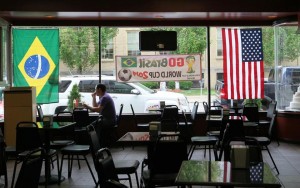Although Spanish has essentially become a second language in many US cities that have large Spanish-speaking immigrant populations, there is another language which has a growing presence in and around the city of Boston – Brazilian Portuguese. In fact, Brazilians in the greater Boston area compose the most significant Brazilian population living in the United States.
 Proliferation of Brazilian Portuguese Speakers in and around Boston
Proliferation of Brazilian Portuguese Speakers in and around Boston
Migration from Brazil is a relatively recent phenomenon, and the Brazilian community not only adds to the cultural diversity of greater Boston, but has also contributed a strong work force. Although a thriving immigrant community, many Brazilians face the challenge of learning to speak English as a second language. According to the 2000 U.S Census Bureau, most foreign-born Brazilian immigrants have not had the opportunity to receive a high school diploma (34%). This makes learning English considerably more difficult, and thus many Brazilians living in the United States are not fluent in English. In fact, one recent study indicates that up to 25.7% of Brazilians currently living in the United States have Limited English Proficiency (LEP).
The issue of poor language proficiency has many practical implications for all immigrants making a new life in their adopted country. One issue is related to patient care, as effective communication is critical in making an accurate diagnosis and ensuring that patients clearly understand post-care instructions and medical prescriptions. In Boston, Portuguese medical interpreters serve to bridge the language gap in many parts of the city where large populations of Brazilians reside. However, the number of trained Portuguese medical interpreters in the Boston area may not be sufficient to keep up with the growing demand. Massachusetts state and federal legislature require that all emergency care and government-funded medical facilities provide competent interpreters for patients with LEP. As a result of the cost of hiring on-site interpreters, the use of telephonic interpreting services has increased considerably. Although it is less expensive, there is no doubt that on-site medical interpreters are more effective.
Another area of immigrant life which must be considered is language as it relates to education. For many children who speak their native language at home, their English may not be sufficient to receive an education outside of their native language. There are three different types of bilingual education programs currently available in the Boston Public School system. The first is the “transitional” class where children learn academic subjects in their native language, while working to improve their English so that they can join classes given in English. This program is currently offered in several languages, including Portuguese. The second kind of program is a “multilingual” class, where students who are non-native English speakers study all academic subjects in English, with support to improve their English. The third program is known as a “dual” bilingual education where students who are native English speakers learn alongside native non-English speakers – and all students learn both languages. Although this program is more commonly offered in Spanish, there are some schools such as the Kings Open School in Cambridge where classes are conducted in Portuguese. In addition, there are a number of preschool programs aimed at improving English fluency among soon-to-be elementary school children. These programs are often staffed by bilingual, native Brazilian Portuguese speakers.
For many immigrants every day services such as legal advice, employment, banking, accounting, or even shopping are challenging due to language barriers. Some choose to live in neighborhoods where they can get by more easily in their native language. In many Boston communities where Brazilians are prominent, language is less of an issue due to the many businesses that are run by or employ native Brazilian Portuguese speakers. Moreover, there are several organizations that have been set up to help workers who are not fluent in English. Founded in Boston by immigrant workers in 1995, the Brazilian Immigrant Center is one such agency designed to support and protect the rights of Brazilian immigrant workers under Massachusetts and US labor laws. Due to Boston’s fast growing Brazilian population, these types of organizations are growing in number.
 The Brazilian community has significantly contributed to the cultural diversity of the greater Boston area. One example was a 2012 exhibit at the Boston Institute of Contemporary Art by the Brazilian artists “Os gêmeos” and their outdoor street murals was also exhibited in Boston’s Dewey Square as well as in Somerville. In response to the growing Brazilian population, the city has established support services in every arena. However, there is a continued need to improve these services for Brazilian immigrants so that they can ultimately succeed, contribute and assimilate into American society. Providing specialized Portuguese language services is one important way that this can happen.
The Brazilian community has significantly contributed to the cultural diversity of the greater Boston area. One example was a 2012 exhibit at the Boston Institute of Contemporary Art by the Brazilian artists “Os gêmeos” and their outdoor street murals was also exhibited in Boston’s Dewey Square as well as in Somerville. In response to the growing Brazilian population, the city has established support services in every arena. However, there is a continued need to improve these services for Brazilian immigrants so that they can ultimately succeed, contribute and assimilate into American society. Providing specialized Portuguese language services is one important way that this can happen.
About Language Connections:
Language Connections is one of the top language service companies in the US. Over the last 30 years, we’ve focused on providing the best business translation services, interpreting services, as well as interpreter training and customized language training programs. In addition to top-tier corporate language training, we offer certified corporate interpreters and professional business translation services in 200+ languages. Our network includes linguists with backgrounds in all major industries. They’re ready to meet your needs, whether they’re for technical translation services, legal translation, government translation services, international development translation services, education translation services, life sciences translation, or something else. Reach out to us today for a free quote on our cost-efficient and timely translation services, interpreters, or other linguistic services.
Language Connections LLC
2001 Beacon Street, Suite 105,
Boston, MA 02135
Phone: +1-617-731-3510
Email: service@languageconnections.com



